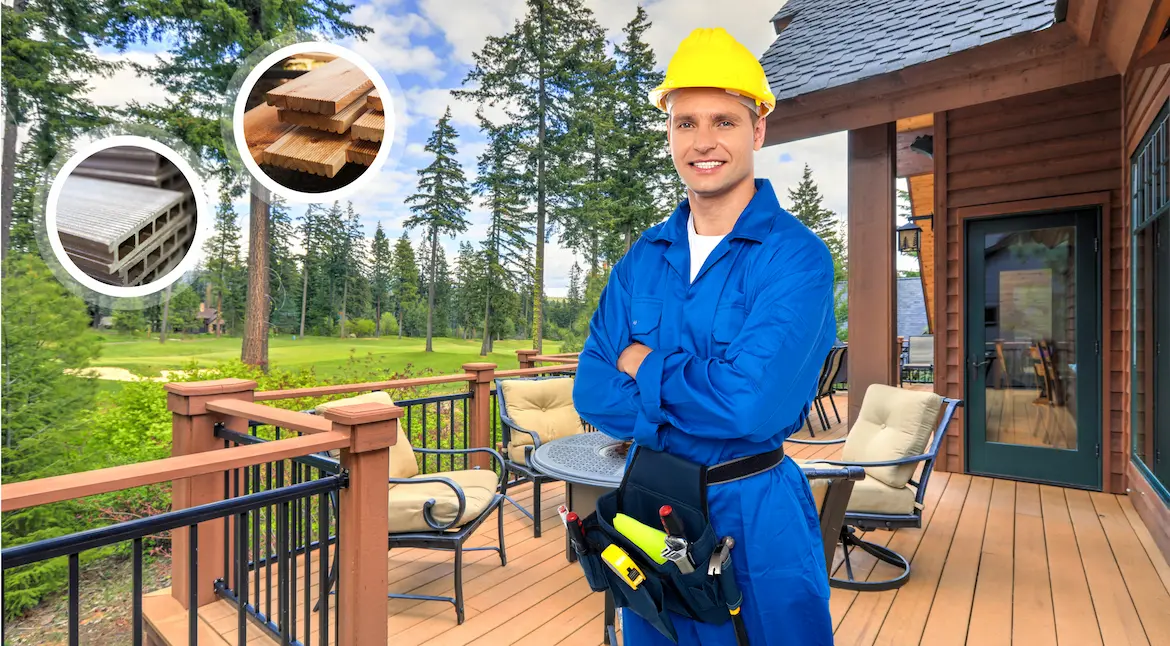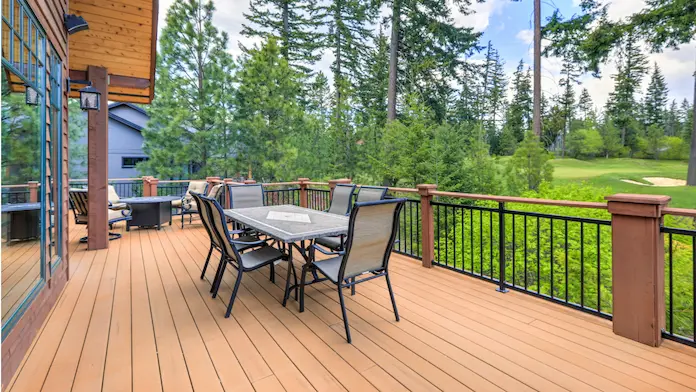How Much Does It Cost to Build a Deck?
Key Points
- For most homeowners in the U.S., the average deck installation cost will be $4,000 to $12,000, with the national average sitting around $7,500.
- The price can vary depending on factors like materials, size, design complexity, and labor.
- You can reduce costs by doing some work yourself.
Factors that Affect Decking Pricing

When planning to build a deck, keep in mind the factors that can significantly affect the overall cost. Understanding them can help you budget effectively and make informed decisions. Let’s delve into each factor in detail:
Deck Size
- Small deck (200 sq ft): Ideal for intimate gatherings or small yards. Price range: $6,000 - $12,000.
- Medium deck (300-400 sq ft): Suitable for most family homes, accommodating dining and lounge areas. Price range: $9,000 - $24,000.
- Large deck (500+ sq ft): Perfect for expansive properties or those who frequently entertain. Price range: $15,000 - $30,000+.
Materials
| Material | Price per Square Foot | Pros |
|---|---|---|
| Pressure-Treated Wood | $15 - $25 | The most affordable and widely available option but may require regular maintenance |
| Cedar or Redwood | $25 - $35 | Natural woods with better resistance to rot and insects, with an attractive look |
| Composite | $25 - $45 | Low maintenance, resistant to rot and insects |
| PVC (Vinyl) | $30 - $60 | Excellent durability, low maintenance, resistant to weather conditions |
| Aluminum | $40 - $70 | Extremely durable, rust-resistant, lightweight |
| Ipe (Brazilian Hardwood) | $30 - $60 | Extremely durable, resistant to insects and decay, and luxurious design. However, it can be challenging to work with |
| Bamboo | $20 - $40 | Eco-friendly and durable solution, a highly renewable resource |
| Mahogany | $30 - $50 | Beautiful, strong, and durable material |
| Fiberglass | $25 - $50 | Lightweight, water-resistant material requiring very little maintenance |
| Recycled Plastic | $30 - $50 | Eco-friendly, resistant to rot and insects |
Design Complexity
A simple rectangular deck is less expensive to build than a multi-level deck with intricate patterns or built-in features like benches and lighting. Custom designs typically add an extra $5 to $10 per square foot to the overall price.
The basic design includes a simple rectangular or square shape. The construction is single-level, with a basic railing design. Its price range is $15 to $30 per sq. ft.
The complex design includes multi-level decks, unusual shapes or curved edges, built-in features like benches or planters, or intricate railing designs. Its price range is $35 to $60+ per sq. ft.
Complex designs often require more skilled labor and additional materials, driving up costs.
Labor Costs
If you hire professionals, labor can account for 50% to 60% of the total cost. Labor costs to build a deck also depend on the location and contractors’ experience. The price will vary depending on your region and the local demand for contractors. Also, highly experienced and reputable contractors may charge more, but their expertise can ensure a high-quality finished product.
For professional installation, labor rates range from $8 to $22 per square foot, depending on the complexity of the project and your location. Keep in mind that if you decide to install a deck yourself, you can save on labor costs, but you’ll need the right skills and tools to ensure quality.
Permits and Inspections
Foundation and Site Preparation
If you build your deck on uneven ground or it requires additional support structures, foundation, and site preparation, approximate deck cost can increase. For instance, installing concrete footings or piers can cost between $50 and $150 per footing. If grading or clearing the site is needed, expect to pay an additional $500 to $2,000, depending on the extent of the work.
Preparation works may include:
- Leveling ground: $500 - $2,000
- Removing an old deck: $500 - $2,500
- Foundation work: $1,000 - $3,000. May be necessary for larger decks or challenging terrain
Seasonal Factors
- Peak season (late spring to early fall): Prices may be higher due to demand
- Off-season (late fall to early spring): Potential for discounts, but weather may cause delays
Geographic Location
- Urban areas: Generally higher costs due to increased labor rates and living expenses
- Rural areas: May have lower labor costs but higher material transportation fees
Additional Features
- Stairs: $150 - $300 per step. The price depends on materials, width, and local building codes.
- Railing: $20 - $50 per linear foot. They can be made of wood, metal, glass, or composite. Prices vary based on style and material.
- Built-in seating: $100 - $500 per linear foot. They can include storage options underneath.
- Pergola: $2,000 - $5,000. They provide partial shade and architectural interest. The cost varies based on size and materials.
- Lighting: $8 - $30 per light fixture, plus installation. They enhance safety and ambiance for evening use.
- Fire pit: $500 - $5,000. Built-in options cost more but offer a seamless look
Finishing and Maintenance
Finishing touches, such as staining, painting, or sealing, can add another $500 to $1,500 to the total cost. Some materials, like composite or PVC, require little to no maintenance, while wood decks will need periodic sealing and staining, which can cost about $300 to $800 every few years.
Deck Building: Ongoing Costs

Cleaning and Maintenance
Staining, Sealing, and Painting (For Wood Decks)
Deck Repairs
- Minor repairs: Replacing a few boards or fixing railings can cost between $100 and $500, depending on the material and scope of the work.
- Major repairs: Structural repairs, such as reinforcing the foundation or replacing large sections, can cost anywhere from $1,000 to $3,000, or more for extensive damage.
Pest Control (For Wood Decks)
Wood decks, especially made of pressure-treated or untreated wood, are susceptible to termites and other wood-boring insects. Regular pest inspections and treatments are recommended to prevent infestations. Annual pest control treatment costs from $100 to $300.
Deck Furniture and Accessories
- Basic furniture: A simple set of outdoor furniture can cost between $200 and $600.
- High-end furniture: Premium furniture and accessories like outdoor sofas or custom seating can cost $1,000 to $3,000 or more.
Lighting and Electrical Maintenance
- Lighting maintenance: Replacing outdoor bulbs or repairing electrical fixtures typically costs between $50 and $200 annually.
- Electrical repairs: Larger electrical issues, such as replacing wiring or fixing outdoor outlets, can cost between $200 and $500.
Insurance
Some insurance policies may cover damage to your deck, but in some cases, you may need to increase your coverage or add an endorsement. Adding or increasing coverage for a deck may raise your premium by about $50 to $200 annually, depending on your provider and the deck’s value.
Winter Preparation
- Snow removal: You can either shovel snow yourself or hire a service, which typically costs $25 to $75 per snow event, depending on the size of the deck and local rates.
- Ice-melt products: Safe, deck-friendly ice-melting products cost around $20 to $50 per container, depending on the brand and quantity.
Should You Build a Deck Yourself or Hire a Pro?
- Cost: Lower upfront cost (no labor fees); materials only
- Skill Level Required:
Requires basic to advanced carpentry skills - Time Investment:
High; could take weeks or months depending on your schedule - Tools and Equipment: Must purchase or rent necessary tools
- Quality of Work: May vary based on experience
- Permits and Inspections: Must handle permits and inspections yourself
- Customization: Limited by your skill level and experience
- Risk of Mistakes: Higher risk of mistakes, which could lead to costly repairs
- Resale Value Impact: May lower resale value if not done correctly
- Cost: Higher cost (labor + materials); may offer warranties
- Skill Level Required: Professionals have the necessary experience and knowledge
- Time Investment: Faster completion, often within a week or two
- Tools and Equipment: Professionals have all the necessary tools
- Quality of Work: High-quality work with professional standards
- Permits and Inspections: Professionals manage permits and inspections
- Customization: Experts can create complex, customized designs
- Risk of Mistakes: Lower risk due to professional experience
- Resale Value Impact: Increases home value with professional construction
If you choose to hire a pro, follow these steps to find a reputable deck builder:
- Ask for recommendations from friends, family, or neighbors who have recently built decks.
- Verify licenses and insurance. Most states require deck builders to be licensed.
- Get at least three cost estimates of deck construction to compare prices and services.
- Ask for a portfolio of past work and references from previous clients.
- Ensure all details are included in a written contract before work begins.
- Pre-screened professionals: The service vets contractors for proper licensing and insurance.
- Detailed profiles: View contractor ratings, reviews, and photos of past projects.
- Free quotes: Easily request and compare estimates from multiple professionals.
- Satisfaction guarantee: The service stands behind the work of its network professionals.
Saving Tips on Building a Deck
- Plan and Design Wisely: Start with a clear plan. Simple designs are often more cost-effective. Avoid complex shapes and multi-level decks, which require more materials and labor.
- Choose Affordable Materials: Pressure-treated wood is a budget-friendly option compared to composite or exotic hardwoods. It offers durability at a lower cost. Consider using reclaimed wood for a rustic look and additional savings.
- Optimize deck size and shape: Design a smaller, simpler deck that meets your needs. A basic rectangular shape is easier and cheaper to build than complex, multi-level designs.
- Do some work yourself: Tackle simpler tasks like demolition, staining, or sealing to save on labor costs. This could save you $20 to $35 per hour in labor.
- Shop around for materials: Compare prices at different suppliers and look for seasonal sales. Buying in bulk can often lead to discounts of 10% or more.
- Time your project wisely: Build during the off-season (fall or winter) when contractors may offer lower rates, potentially saving 5-15% on labor costs.
- Plan for minimal ground preparation: Choose a relatively flat area for your deck to reduce excavation and foundation costs, which can run $1,500 or more.
- Use standard sizes: Stick to standard lumber lengths and deck board sizes to reduce waste. This can save 10-15% on material costs.
- Skip the extras initially: Build a basic deck now and add features like built-in seating or a pergola later. This can defer $1,000 to $5,000 in costs.
- Maintain your deck regularly: Proper maintenance extends your deck's lifespan, saving money on earlier repairs or replacement.
Conclusion
Frequently Asked Questions
- Will a new deck add to the home value?
- Yes, building a deck can significantly increase your home’s value, providing a return on investment of approximately 45% to 55% upon resale, depending on the material used and local market conditions.
- What is the deck lifespan?
- A wooden deck typically lasts between 10 to 25 years, while a composite deck can last from 25 to 50 years. The lifespan depends on the materials used, the quality of construction, and maintenance practices.
- How long can I expect to build a deck?
- The construction time for a deck varies based on its size and complexity. A simple deck can take about 5 to 7 days, while larger and more intricate designs may require 2 to 4 weeks.
- What is the most affordable material?
- Pressure-treated wood is generally the most affordable decking material, costing less upfront compared to other options like composite or exotic hardwoods. However, over time, it may require more servicing.
